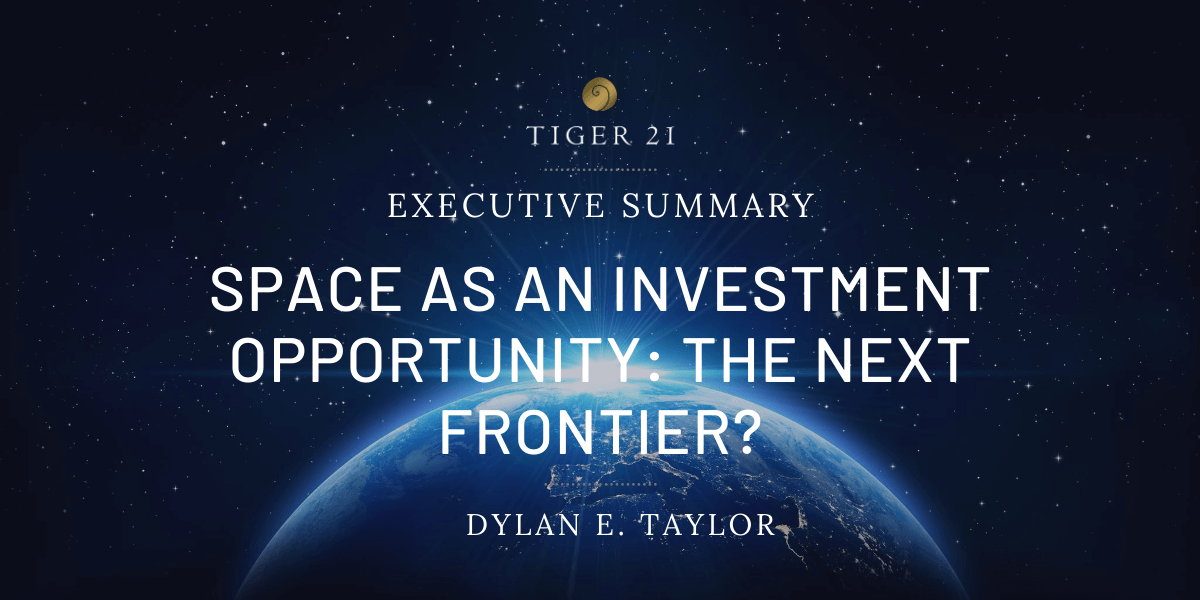Space as an Investment Opportunity: The Next Frontier?

OUTLOOK:
Space investing is a large and exponentially growing market. The global space economy is expected to grow from $350 billion to $1.1t+ by 2040 according to Morgan Stanley (Investment Implications of the Financial Frontier, 2017). These numbers may be exceeded as every industry will be disrupted by space technologies.
- Why now?
- Disruptive Forces:
- Launch Reusability
- Microsatellites and the “Mega-Set”
- Space Tourism
- Investing Opportunities
- Other Ways to Get Involved
EXPERT SPEAKER CALL, EXECUTIVE SUMMARY
SPEAKER: Dylan E. Taylor, Chairman & CEO, Voyager Space Holdings, and TIGER 21 Member
Space investing is a large and exponentially growing market. The global space economy is expected to grow from $350 billion to $1.1t+ by 2040 according to Morgan Stanley (Investment Implications of the Financial Frontier, 2017). These numbers may be exceeded as every industry will be disrupted by space technologies. This thesis is based on trends in commercial space:
- Why now? We are now at the front-end of a classic innovation “S Curve” but none of the innovators have yet reached scale. There is now a “new space” sector characterized by increased innovation, new technologies, and new business models — creating increased competition and novel commercial solutions.
- Disruptive Forces:
- Launch Reusability: Due to reusability and other innovations, the launch market has been disrupted and launch costs have plummeted from $100,000/lb. in 1980 to $100/lb. in 2020. Extraordinary cost differences are opening up a whole new area of business plans. Imagine disposable airplanes, basically throwing away your airplane at the end of the flight? Rocket reusability is now a reality through Space X. Blue Origin and Space X have been able to fly booster rockets seven or eight times. Not just about cost, but also cycle time.
- Microsatellites and the “Mega-Set”: Small, light, and cheap satellites will transform Earth observation. Previous hardware would cost upwards of $50+ million dollars. Now, companies like Planet can send their “Dove” up, which is a 5kg satellite that costs between $100,000 and $300,000 with off-the-shelf electronics. It is easier to get into orbit and can get it into space much cheaper. There are also new ways to create value from data through artificial intelligence and predicative analytics – leading to a multi-trillion-dollar opportunity.
- Space Tourism: This is the social element of space. The demand around space investment is about to explode as there is new opportunity to fly above the Karman Line – where space begins at 100km (about 62 miles) above the Earth. To date only 582 people have crossed the Karman Line, only 24 people have seen the earth in totality, and only 12 have walked on the moon. It previously cost $35-50 million/person to go into space, but the price for an early ticket on Virgin Galactic is $200,000/person. It is essentially a space plane that goes above the Karman Line. Blue Origin is another option and the cost is expected to be about $250,000/person. Essentially anyone can now go into space and a new private space station is in the works as well.
KEY TAKEAWAYS:
You can invest in subsectors of the space industry. Lots of opportunities are happening with deep space, including exploration of the Moon and ultimately Mars, and there are many ways to make investments.
INVESTING OPPORTUNITIES:
Angel Groups – This type of space investing is not for the faint of heart as there are a lot of flameouts. You need one successful company for every 10 investments. Therefore, you can’t do 2 or 3 angel investments, but rather a full portfolio of at least 10 investments as the risk profile is high. Angel groups are a good way to get your feet wet. Check size would be about
$25,000 – $100,000 per investment.
Funds – There are many new space funds being formed. There are at least seven and they range from early-stage funds to late-stage funds that may be pre-IPO. Some are based in the
U.S. and others are international and worth considering.
Holding Companies – Voyager Space Holdings is a holding company. In space investing you get economic value for assembling capabilities. If you have a spacecraft and launch company such as SpaceX you have an economic advantage. You can create a lot of value by having an operating company with an assembling capability and can bid on larger and larger missions as you control more of the value chain and what is to be outsourced. If you are the “prime” you determine the economics of the supply chain.
Publicly Traded – Lockheed and Boeing are publicly-traded, but they are not pure play space stocks. The only pure play space stock is Virgin Galactic, which has a $3 billion market capitalization. They only have one spaceship so there is huge demand for space-based publicly-traded stocks. There are also SPACs – essentially blank-check corporations — being formed to acquire space-based assets. We can expect there will be some additionally publicly- traded companies to come.
ETF – There is just one ETF and it is called, “UFO.” It includes companies such as Lockheed, which are not a pure play space so for maximum space exposure, you likely could do better assembling your own portfolio.
CONCLUSION:
Space investing is emerging and ready to take-off now. Seven of the nine funds that are currently active have been launched in the last twelve months. The holding companies have been formed within the last twelve months and Virgin Galactic also went public in the last twelve months. There is opportunity as a lot of the big payoffs in space are high return on invested capital, but IRR can be very stressed due to delayed payoffs in the industry. Other opportunities to get involved in space besides direct investing are through mentorship, news and information sites for enthusiasts, and going to a rocket launch in person – an extraordinary experience.
*These statements are provided by Dylan E. Taylor rather than TIGER 21.
About TIGER 21
TIGER 21 is an exclusive global community of ultra-high-net-worth entrepreneurs, investors, and executives.
Explore the TIGER 21 Member ExperienceMember Insight Reports










